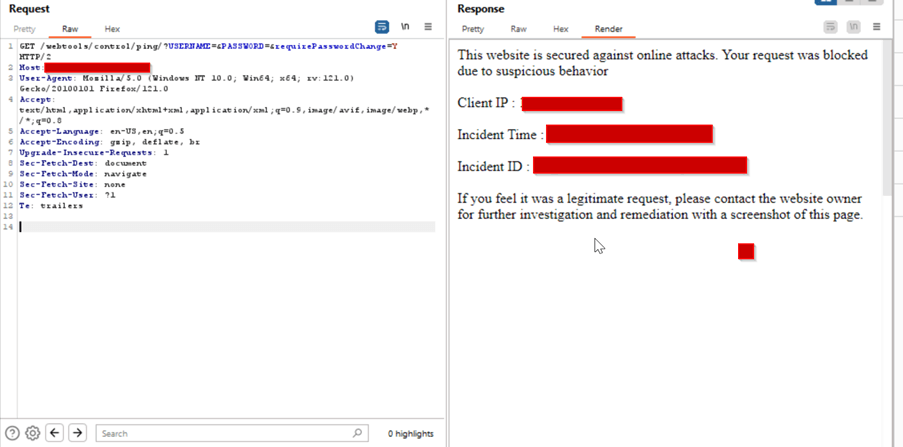AppTrana
Getting Started
Frequently Asked Questions
Product Details
Browser Protection
API Scan Coverage for OWASP Top 10
Malware Scanning for File Uploads
Whitelist Vulnerabilities on the AppTrana WAAP
API Request to Purge CDN Data
Analysis page - Attack Trend Visualisation
Update Origin Server Address
Advanced Behavioral DDoS
BOT Protection
Asset Discovery
Customize Application Behavior with Bot Score
Restricted Admin User
OWASP API Security Top 10 2023 – AppTrana API Protection
Self Service Rules
ASN based IP Whitelisting
Enhance Your API Security with API Classification
SwyftComply for API Scan
Custom Bot Configuration
Configure Custom Error Pages in AppTrana
Configuring Custom Error Page in AppTrana
Enabling SIEM Integration
API Discovery Feature
SwyftComply
Analysis page - Access Trend Visualization
Manage WAAP Email Alerts
Configuring Custom Error and Maintenance Pages in AppTrana WAAP
Enable and Configure Single Sign-On
Origin Health Check Mechanism
WAF Automated Bypass and Unbypass
False Positive Analysis Report on WAAP
DNS Management
Product User Guide
Indusface WAS
Getting Started
Product User Guide
Summary
Dashboard
Malware Monitoring[MM]
Vulnerability Assessment[VA]
Application Audit[AA]
Reports
Settings
Asset Monitoring
New Reporting Structure
API Security Audit
Frequently Asked Questions
Feature Summary
AcuRisQ – Risk Management with Advanced Risk Scoring
Automated API Scanning
WAS Consulting License
API Key Based - Scan Log Export
WAS Defacement Checks
SIEM Integration with Sumo Logic
Indusface WAS Scanned Vulnerabilities
Indusface Newsletter
Indusface Product Newsletter - October 2021
Indusface Product Newsletter- April 2021
Indusface Product Newsletter-January21
Indusface Product Newsletter - June 20
Indusface Product Newsletter - October 19
Indusface Product Newsletter - August 19
Product Newsletter of May 19
Product Newsletter of March 19
Product Newsletter of January 19
WAF Portal Revamp June 18
Product Newsletter of July 18
Product Newsletter of May 18
Product Newsletter of March 18
Product Newsletter of February 18
Product Newsletter of January 18
Indusface Product Newsletter - March 2022
Indusface Product Newsletter - February 2023
Indusface Product Newsletter- October 2022
Zero Day Vulnerability Reports
Vulnerabilities Detected in 2016
CRS vs. Zero Day Vulnerability - December 2016
CRS vs. Zero Day Vulnerability - November 2016
CRS vs. Zero Day Vulnerability - October 2016
CRS vs Zero Day Vulnerability - September 2016
CRS Vs Zero Day Vulnerabilities - August 2016
Vulnerabilities Detected in 2017
Vulnerability Report of April 17
Vulnerability report for Apr 3rd - Apr 9th 17
Vulnerability report for April 17th - Apr 23rd 17
Vulnerability report of April 10th - April 16th
Vulnerability Report of March 17
Vulnerability report for Mar 20th - Mar 26th
Vulnerability report for Mar 13th - Mar 19th
Vulnerability report for 27th Feb - 5th Mar
Vulnerability report for Mar 27th - Apr 2nd
Vulnerability report for Mar 6th - Mar 12th
Vulnerability Report of February 17
Vulnerability Report of January 17
Vulnerability Report of December 17
Vulnerability Report of November 17
Vulnerability Report of August 17
Vulnerability Report of September 17
Vulnerability Report of October 17
Vulnerability Report of July 17
Vulnerability Report of June 17
Vulnerability Report of May 17
Vulnerabilities Detected in 2018
Vulnerability Report of December 18
Vulnerability Report of November 18
Vulnerability Report of October 18
Vulnerability Report of September 18
Vulnerability Report of August 18
Vulnerability Report of July 18
Vulnerability Report of June 18
Vulnerability Reports of May 18
Vulnerability Report of April 18
Vulnerability Report of March 18
Vulnerability Report of February 18
Vulnerability Report of January 18
Vulnerabilities Detected in 2019
Vulnerability Report of December 19
Vulnerability Report of November 19
Vulnerability Report of October 19
Vulnerability Report of September 19
Vulnerability Report of August 19
Vulnerability Report of July 19
Vulnerability Report of June 19
Vulnerability Report of May 19
Vulnerability Report of April 19
Vulnerability Report of March 19
Vulnerability Report of February 19
Vulnerability Report of January 19
vulnerabilities Detected in 2020
Vulnerability Report of December 20
Vulnerability Report of November 20
Vulnerability Report of October 20
Vulnerability Report of Sep 20
Vulnerability Report of July 20
Vulnerability Report of June 20
Vulnerability Report of May 20
Vulnerability Report of April 20
Vulnerability Report of March 20
Vulnerability Report of February 20
Vulnerability Report of January 20
Vulnerabilities Detected in 2021
Vulnerability Report of November 21
Vulnerability Report of October 21
Vulnerability Report of September 21
Vulnerability Report of August 21
Vulnerability Report of July 21
Vulnerability Report of June 21
Vulnerability Report of May 21
Vulnerability Report of April 21
Vulnerability Report of March 21
Vulnerability Report of February 21
Vulnerability Report of January 21
Vulnerability Report of December 21
Vulnerabilities Detected in 2022
Vulnerability Report of January 22
Vulnerability Report of February 22
Vulnerability Report of March 22
Vulnerability Report of April 22
Vulnerability Report of May 22
Vulnerability Report of June 22
Vulnerability Report of July 22
Vulnerability Report of August 22
Vulnerability Report of September 22
Vulnerability Report of October 22
Vulnerability Report of November 22
Zero-Day Vulnerability Report - December 2022
Vulnerabilities Detected in 2023
Vulnerability Report of May 23
Vulnerability Report of March 23
Vulnerability Report of August 23
Vulnerability Report of July 23
Vulnerability Report of April 23
Vulnerability Report of November 23
Vulnerability Report of June 23
Vulnerability Report of December 23
Vulnerability Report of February 23
Vulnerability Report of January 23
Vulnerability Report of September 23
Vulnerability Report of October 23
Vulnerabilities Detected in 2024
Vulnerability Report of October 2024
Vulnerability Report of April 2024
Vulnerability Report of July 2024
Vulnerability Report of May 2024
Vulnerability Report of September 2024
Vulnerability Report of February 2024
Vulnerability Report of December 2024
Vulnerability Report of January 2024
Vulnerability Report of June 2024
Vulnerability Report of March 2024
Vulnerability Report of November 2024
Vulnerability Report of August 2024
Security Bulletin
Vulnerabilities 2024
Hotjar's OAuth+XSS Flaw Exposes Millions at Risk of Account Takeover
Critical Apache OFBiz Zero-day AuthBiz (CVE-2023-49070 and CVE-2023-51467)
CVE-2024-4879 & CVE-2024-5217 Exposed - The Risks of RCE in ServiceNow
ScreenConnect Authentication Bypass (CVE-2024-1709 & CVE-2024-1708)
CVE-2024-4577 – A PHP CGI Argument Injection Vulnerability in Windows Servers
CVE-2024-8517 – Unauthenticated Remote Code Execution in SPIP
CVE-2024-1071 – Critical Vulnerability in Ultimate Member WordPress Plugin
Cryptocurrency Mining Attack Exploiting PHP Vulnerabilities: An Emerging Threat
Oracle WebLogic Server Deserialization
ApacheStructs_VG
Apache Struts 2 Vulnerability CVE-2023-50164 Exposed
Unpacking the Zimbra Cross-Site Scripting Vulnerability(CVE-2023-37580)
Adobe ColdFusion Vulnerabilities Exploited in the Wild
Remote Unauthenticated API Access Vulnerabilities in Ivanti
Multiple Moveit Transfer Vulnerabilities
HTTP/2 Rapid Reset Attack Vulnerability
CVE-2024-9264 - Grafana’s SQL Expressions Vulnerability
CVE-2024-8190 – OS Command Injection in Ivanti CSA
Apache log4j RCE vulnerability
- All Categories
- Security Bulletin
- Vulnerabilities 2024
- Critical Apache OFBiz Zero-day AuthBiz (CVE-2023-49070 and CVE-2023-51467)
Critical Apache OFBiz Zero-day AuthBiz (CVE-2023-49070 and CVE-2023-51467)
Updated
by vinugayathri.chinnasamy@indusface.com
Cybersecurity researchers recently uncovered a critical flaw in the widely used Apache OFBiz Enterprise Resource Planning (ERP) system, CVE-2023-51467.
The zero-day vulnerability CVE-2023-51467 poses a significant threat, boasting a CVSS score of 9.8. This authentication bypass vulnerability stems from an incomplete patch for a previously disclosed Pre-auth Remote Code Execution (RCE) vulnerability, CVE-2023-49070.
Recognizing the system’s wide install base, attackers have exploited this flaw with large-scale attempts.
This blog delves into the details of these vulnerabilities, shedding light on their potential impact and the exploitation techniques employed by attackers.
What is Authentication Bypass Vulnerability?
An authentication bypass vulnerability is a security flaw that allows an attacker to gain unauthorized access to a system or application without providing the proper authentication credentials, such as usernames and passwords.
In essence, it enables an intruder to circumvent the standard authentication mechanisms designed to verify the identity of users and grant access only to those with the correct credentials.
Common causes of authentication bypass vulnerabilities include programming errors, flawed logic in the authentication mechanisms, incomplete patches or updates, or the misuse of certain features.
In the case of Apache OFBiz, the zero-day vulnerability CVE-2023-51467 was attributed to an incomplete patch. The Pre-auth Remote Code Execution (RCE) vulnerability CVE-2023-49070 did not fully fix the underlying issues.
Attackers adeptly analyzed the existing patch, identifying potential flaws and discovering alternative endpoints susceptible to exploitation.
Addressing the Apache OFBiz vulnerability CVE-2023-51467, the importance of virtual patching shines through. Virtual patching offers a swift and robust solution, bridging the gap when traditional patches fall short. Learn more about the protective power of virtual patching.
Vulnerability Analysis
CVE-2023-51467
Severity: Critical CVSSv3.x: Base Score: 9.8 CRITICAL Vector: CVSS:3.1/AV:N/AC:L/PR:N/UI:N/S:U/C:H/I:H/A:H
CVSSv2: Base Score: 9.3 HIGH
Vector: (AV:N/AC:M/Au:N/C:C/I:C/A:C)
Exploit available in public: Yes
Exploit complexity: Low
Unveiled on December 26, 2023, with an identical CVSS v3.x rating of 9.8, this vulnerability emerged from a detailed analysis of the root causes of authentication weaknesses in Apache OFBiz.
Exploitable by remote, unauthenticated attackers manipulating request parameters, CVE-2023-51467 enabled complete bypassing of OFBiz’s authentication and authorization checks.
Significantly, it represented the core authentication weakness that initially manifested through the XML-RPC vector in CVE-2023-49070, making OFBiz servers vulnerable irrespective of XML-RPC being disabled.
CVE-2023-49070
Severity: Critical
CVSSv3.1: Base Score: 9.8 CRITICAL
Vector: CVSS:3.1/AV:N/AC:L/PR:N/UI:N/S:U/C:H/I:H/A:H
Disclosed on December 5, 2023, with a critical CVSS v3.x score of 9.8, this vulnerability exposed a flaw in handling password change parameters within the XML-RPC code in the Apache OFBiz system.
Exploiting this flaw allowed remote unauthenticated attackers to bypass authentication checks, leading to potential remote code execution on vulnerable OFBiz servers.
Exploitation Analysis
Researchers successfully crafted a proof-of-concept (PoC) exploit code for CVE-2023-51467, demonstrating its severity. Two distinct test cases were devised to exploit the vulnerability:
Test Case 1: Empty Credentials with requirePasswordChange=Y:
- The USERNAME and PASSWORD fields are intentionally kept blank.
- The URI includes requirePasswordChange=Y.
- The login function surprisingly returns requirePasswordChange, despite both parameters being empty.
- The conditional block is bypassed, allowing the checkLogin function to return success and facilitating authentication bypass.
Test Case 2: Known Invalid Values with requirePasswordChange=Y:
- Known invalid values are assigned to the USERNAME and PASSWORD parameters.
- The URI retains requirePasswordChange=Y.
- Similar to the previous case, the login function responds with requirePasswordChange.
- The conditional block is again bypassed, leading to a successful authentication bypass.
This dual-threat vulnerability allows unauthorized access and opens the door to a Server-Side Request Forgery (SSRF) exploit, adding complexity to the potential repercussions for organizations relying on Apache OFBiz.
Prevention and Mitigation
If the Apache OFBiz vulnerability is exploited, it could lead to severe risks. Unauthorized access could grant attackers control over the system, compromising confidential information and disrupting vital services.
The exploit might also create opportunities for supply chain attacks.
Given the widespread use of Apache OFBiz, a large-scale, coordinated attack could target multiple sectors simultaneously, leading to a more extensive and severe issue.
Therefore, addressing such vulnerabilities promptly is crucial to mitigate these risks.
Affected Versions:
- CVE-2023-51467: 18.12.10 and below are impacted.
- CVE-2023-49070: 18.12.9 and below are affected.
Address a security vulnerability by upgrading to the latest release, Apache OfBiz 18.12.11. Review the Apache Security Advisory for the latest security updates – Apache Security Advisory.
AppTrana WAAP Threat Coverage
AppTrana’s Web Application and API Protection (WAAP) customers are protected against CVE-2023-51467 and CVE-2023-49070.
In addition to the official patches, our dedicated Indusface Managed service team has deployed an extra layer of defense through a customized rule.
Rule ID | Name |
99946 | Apache OFBiz Auth bypass and Pre-Auth RCE Vulnerability (CVE-2023-49070 and CVE-2023-51467) |
This rule quickly finds and stops any misuse of Apache OFBiz weaknesses without relying on vendor patches.
AppTrana WAAP in action – A practical demo of an authentication bypass attack on Apache OFBiz:

Malicious requests sent via Burp are promptly blocked by the WAAP, accompanied by a robust response with a status code 406.

The error message displayed along with incident details:

Stay tuned for more relevant and interesting security articles. Follow Indusface on Facebook, Twitter, and LinkedIn.
